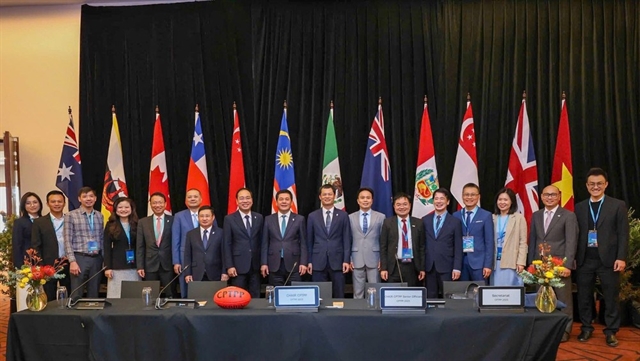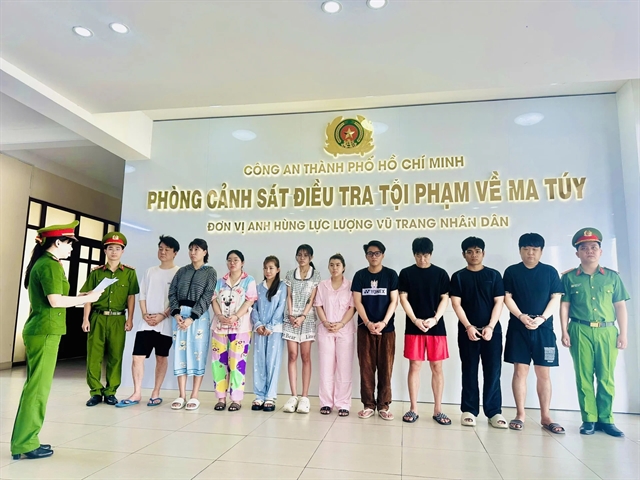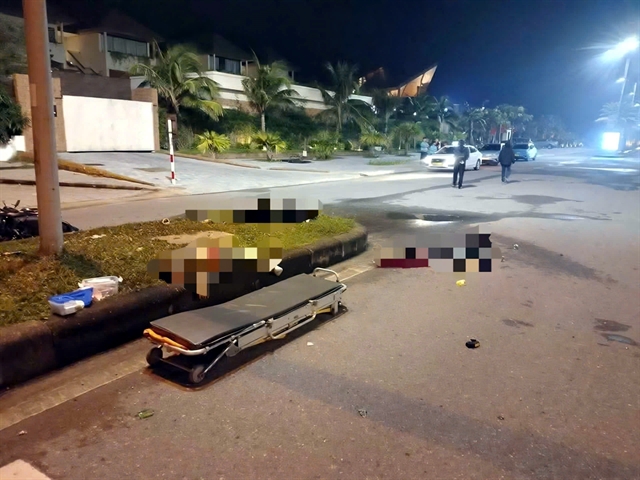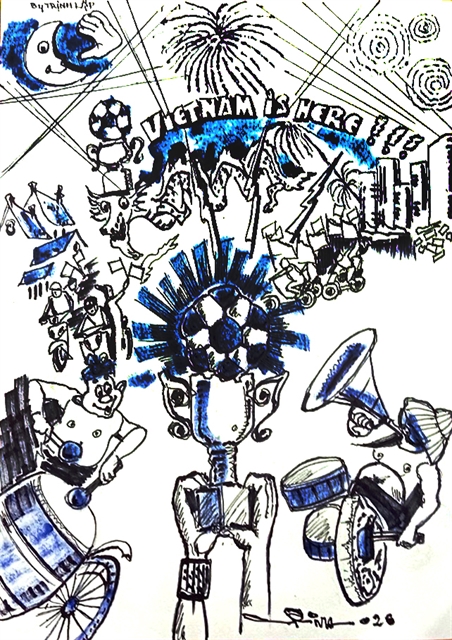 Talk Around Town
Talk Around Town
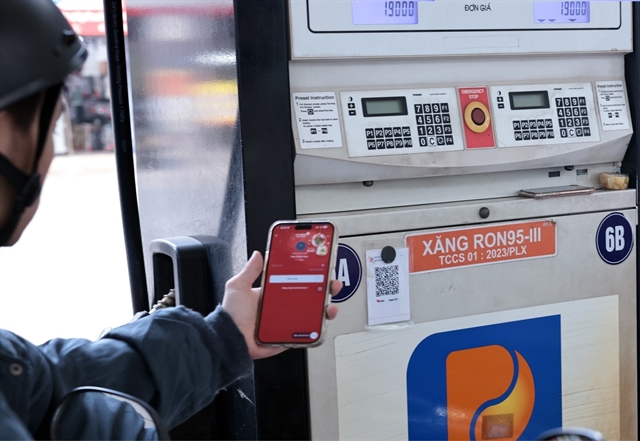
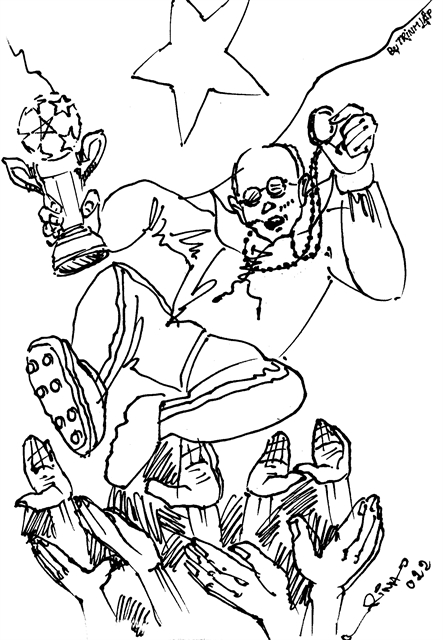 |
| Illustration by Trịnh Lập |
by Anh Đức
If you asked football fans around Việt Nam in 2017 who Park Hang-seo was, virtually nobody could give you an answer. They certainly can now.
When the 65-year-old native of Sancheong in South Korea was appointed manager of the Việt Nam national team in October 2017, eyebrows were raised, fans were confused, and many media outlets still mispronounced Park's name.
Fast forward five years, and Park Hang-seo is now a household name, a popular face in advertisements, and even a character in a popular Vietnamese TV series Thương Ngày Nắng Về was named after him.
Not even Park himself expected this when he was jobless and spent days fishing by the Gyeongho River. The thought back then was that his career was over.
Had it not been for his wife's ingenuity and insistence, Park would have never tried to reach his final dream.
"I was pondering about the decision to accept VFF's offer (to become Việt Nam's football manager), and my wife tried to persuade me," said Park in a documentary by Vietnamese national VTV.
"She was afraid I would change my mind at the last minute, so she woke me up early and drove me to the venue for the contract negotiation."
Thankfully, Park signed the contract that would change his and the fortune of Vietnamese football forever.
Before Park came, Vietnamese football was in shambles. After Henrique Calisto's departure in 2011, seven coaches took the hot seat as Việt Nam's manager.
From former Hertha Berlin coach Falko Goetz, who managed for four years in the top levels of Germany, to the Japanese Toshiya Miura, who had decades working in the J-League, to top Vietnamese coaches Phan Thanh Hùng, Hoàng Văn Phúc, Nguyễn Hữu Thắng who won multiple silverware with V-League sides, they came and went.
Still, no one could bring Việt Nam anywhere near the glory of Calisto's 2008 AFF Cup victory.
The Golden Star Warriors were expected to lose in continental competitions and crash out in group stages. In Southeast Asia, Việt Nam was almost always certain to lose against Thailand, with Malaysia, Singapore, and Indonesia slowly closing the gap.
Mentality-wise, Việt Nam football sides were weak and prone to choking in pivotal moments, and incapable of holding flimsy leads. Strange losses and past match-fixing scandals stopped fans from believing in the national team.
Attendance at the V-League plummeted: empty stadiums, low TV viewership, and sponsors leaving were dark omens for Vietnamese football.
Moreover, the sense of national shame translated to matters outside of football. Some Vietnamese did not believe their compatriots could achieve greatness alongside other countries worldwide.
But all these things were shattered when Park took the reins as Under-23 coach. A team of two generations of Vietnamese football talent was brought together with a special ingredient: courage.
The Việt Nam U23 were drafted into a group that many would dub "Group of Death." The top two Asian sides, Australia and South Korea were in the mix, with dark horse Syria in between. Many pundits gave Việt Nam no chance.
Việt Nam started the group with a narrow loss to South Korea. The door got narrower, but Park and his team did not relent. A surprise victory against Australia with a wonder goal from Nguyễn Quang Hải was not enough to persuade the pundits. In the final game against Syria, a courageous defensive display secured the Young Warriors' place in the quarterfinals.
Before Park's reign, there was a myth that Vietnamese players did not have the stamina to compete for 90 minutes, let alone have the composure and strength to go through extra time and penalties.
"When I took the job, I asked the VFF if they could show the team's biggest problem. They said that was stamina, so I asked for proof in data and numbers, but there was nothing," said Park in an interview with MBC.
"Before they were even born, the players were told that their endurance was weak; the press further reinforced that belief. That belief stuck. All I had to do was open the door to clear their minds."
With the door unlocked, Việt Nam found the will they needed to surprise and progress even further in the playoffs, beating giants Iraq and Qatar after gruelling 120 minutes of play and penalties to reach a final of a major continental competition for the first time.
In the final, they faced Uzbekistan, in conditions not many Vietnamese have ever seen. It was a physical battle of football -- in snow.
Park's team conceded first but soon equalised through Quang Hải's memorable free kick. Extra time came again, but Việt Nam could not pull through like their last two matches and lost in the 120th minute.
At that time, Park gave one of the most memorable speeches that inspired many Vietnamese and probably summed up the miraculous tournament.
When all players and staff were speechless, and some even cried, Park simply said: "We did our best. Why are you hanging your heads in shame? We just made history for Vietnamese football. Be proud of your contributions. We will be victorious the next time we play."
And from that moment, a generation of Vietnamese footballers that never gave up was born. The "Miracle of Changzhou" reignited the long-lost passion of Vietnamese for football, and that sense of national pride was reborn.
"Park's success was in moulding a generation of players that were weak in willpower and team spirit into a group of players with strength and discipline," said Nguyễn Đức, a fan.
"With a modern three-at-the-back system, Park also encouraged players such as Quang Hải, Hoàng Đức, Hùng Dũng or even veterans such as Trọng Hoàng to surpass their limits."
The success of Park and his team has even been seen in the relationship between Việt Nam and South Korea.
Whenever Việt Nam win and people go out to celebrate, the flag of South Korea is often seen with the flag of Việt Nam. Many South Korean coaches have come to Việt Nam looking for opportunities and succeeded. Many South Korean companies and corporations have also flourished from the partnership, oddly strengthened by one man.
In a time when wartime wounds are still visible, Park's inspiration and efforts have been crucial in healing and improving the relationship between the two countries.
"Park's success in Việt Nam created a boom in interest for our country in South Korea," said Đức Thắng, a football blogger. "The viewership ratings for Việt Nam national team's games in South Korea are off the charts."
A football content creator, An Vũ, said: "Mr Park touched me by how he cared for his players. I was most impressed by his handwritten letter in Vietnamese that he wrote to Hùng Dũng after a horrendous injury."
Behind the success, coach Park always looks deep in thought. Even when he achieved all the prizes that Việt Nam craved, he was never once complacent.
"All fame and admiration will someday dissipate like dust. That is why I never think of past glory," Park told VTV.
And with that thought, on October 17, Park announced that he would not re-sign and would leave the post of Việt Nam national football team head coach after the 2022 AFF Championship.
"It's a sinking feeling, but I am not surprised," said blogger Thắng. "Park led us to glory in recent years, a feat that cannot be equalled soon, but he has also been a little conservative and had some issues recently. His decision to leave is reasonable and timely."
Every journey comes to an end, and so does Park's with Vietnamese football. Although his reign was sometimes polarising, there is no shadow of a doubt that he should receive the nation's most grateful appreciation.
Throughout his time as Việt Nam's coach, Park never once gave in and always tried his best to improve his players each and every single day. And for that, he will never be forgotten. — VNS

